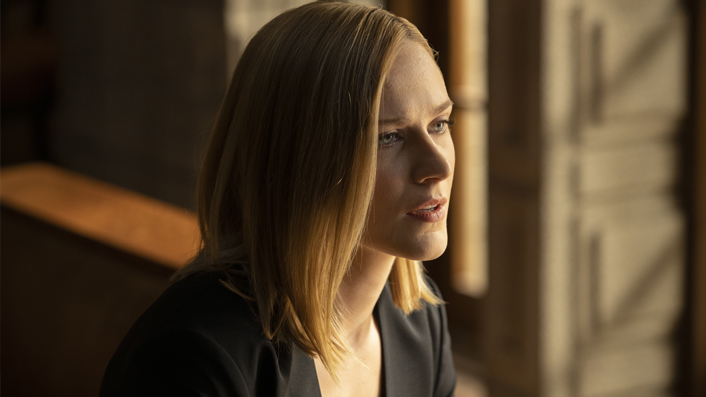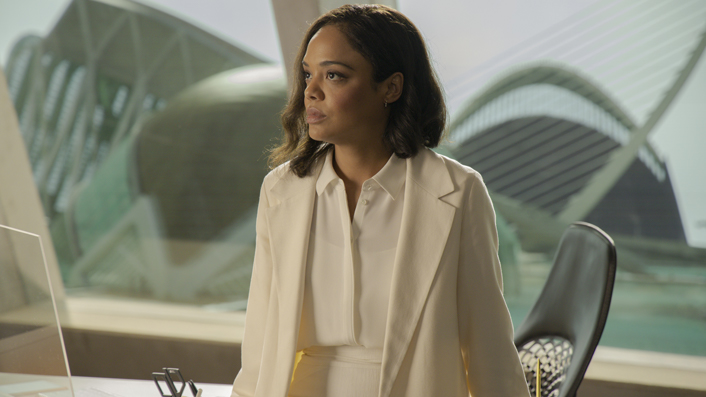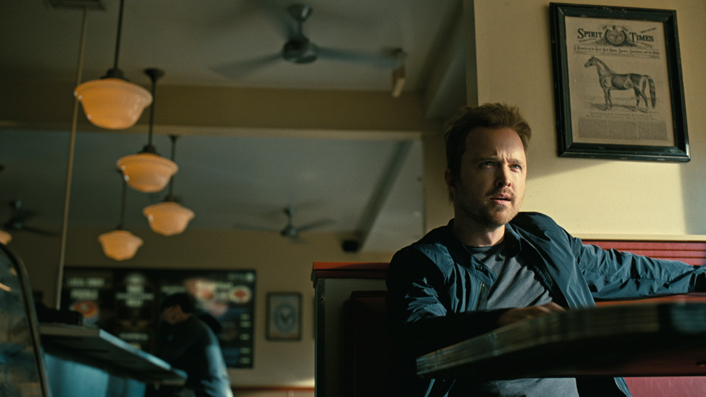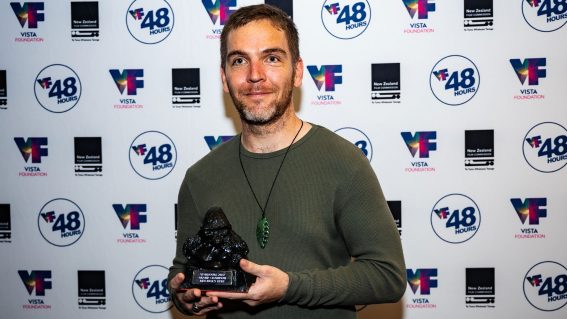Westworld episode 3 radicalises us and Tessa Thompson dazzles
Our recap dives into the details of this week’s new Westworld ep.

Tony Stamp untangles this week’s episode of Westworld, once again crammed full of drama and detail, and streaming on Neon.
I’ve been trying to figure out why Incite’s algorithm-powered mega-AI is called Rehoboam (which I incorrectly identified as ‘Rohoybimhfgjdf’ or something a couple weeks ago in my episode one recap). Some cursory research tells me it’s named after the king of the United Monarchy of Israel around three thousand years ago, who faced a rebellion that split the kingdom in two. Another scan of Westworld’s third season announcement trailer makes the link explicit: Incite’s first model was named Solomon—Rehoboam’s father.
See also
* All new movies & series on Neon
* All new streaming movies & series
* All our Westworld coverage
In the Westworld chronology, Solomon was built in 2038, tamping down various ‘anomalies’ like a presidential impeachment & a nuclear incident, before the wheel of data depicted goes nuts around 2058, when the show is set (it’s unclear when Rehoboam replaced the older model, or if we’ll find out why). Who knows what the Incite folks were thinking, but I might know where our showrunners Lisa Joy and Jonathan Nolan are coming from. Rehoboam is king, for now, and we’re about to see two tribes form—humans and Hosts.

Dolores goes some way toward achieving that goal this week, and along the way she reveals to her new human pal Caleb (and us) how Incite controls his life. It’s not that complicated: the system knows he has a history of depression, that he has a mom with Alzheimers; knows everything about him up to that point, so it doesn’t let him progress (as illustrated by that AI job rejection in episode one). Dolores lays it out: “It’s not about who you are. It’s about who they let you become”.
So according to Rehoboam’s predictive algorithm, Caleb will kill himself in ten to twelve years, on the pier where he drank his first beer. And given this prediction, the system works to make it happen. My favourite line of dialogue this ep was from Dolores, crystal clear: “They won’t invest in someone who’s going to kill himself, but by not investing they ensure the outcome”.
It doesn’t take too much squinting to see the link to our current timeline: growing unrest about the one percent, increasing wealth gaps and so on, but what’s interesting is how it aligns us the viewers with Caleb, and by extension Dolores. As he is radicalised, so are we. Dolores may be out to end humanity, but she’s going to do it by cutting the cord to the system. And it’s hard not to root for that. Humans tend to like freedom.
The other real-world issue Westworld is playing with here is privacy laws and data harvesting by tech companies—something that season two also hinged on. But this hits closer to home, because in the show’s timeline, that’s happening now, and something like Rehoboam is the natural outcome. A peek at Incite’s website shows something called the Privacy Act of 2039, that forced ‘Big Data’ to be transparent about what it was doing (presumably clearing the way for Incite’s algorithm to control everything).

Which leads us to Engerraund Serac, and what we now know his goal to be. He wants that dang data that Dolores smuggled out of the park, and the encryption key that’s in her noggin. We discover this during a clandestine meeting with the unnamed Host piloting a Charlotte Yates body, conducted via holo-glasses. It’s interesting to see Serac (named, by the way, after a column of glacial ice), on the back foot somewhat. After all, he lets us know that Rehoboam saw the Westworld massacre coming, he knows where the key is, he seems to know everything—but he’s unaware (apparently), that his mole isn’t the same Charlotte who approached him to do a little corporate espionage anymore.
And while we don’t know who she is either, she’s the character we spend the most time with this week. Hats off to Tessa Thompson’s performance, which telegraphs uncertainty and curiosity while playing her part as a corporate boss and estranged wife and mother. I never forgot that it was someone else peering out from Charlotte’s eyes as she reacts to all this new information.
This imitation game is driving her crazy, or course. When we see her awoken by Dolores and coming to grips with her new body (after that stunning sequence of it being constructed, down to the close-up of an eye being weaved into existence), she’s childlike, innocent. Dolores tells her she’s “a creature of beauty and power”, and that “without Delos there will never be any more of our kind”, so she’s installing her as their temporary CEO. Easy as that.

But pretty soon (at least a few months later if we’re going by Dolores’ longer hair), ‘Charlotte’ is self-harming, carving a circle/ line pattern into her skin and saying she feels like the real Charlotte is “trying to take back control”, like she’s going to reach in and “rip me out of her head”.
Dolores’ reassurance has an ominous undertone: “You belong to me. You know that right?”
She spoons ‘Charlotte’ much like the latter had spooned ‘her’ son Nathan a few scenes before, just before he complained “I want my own mommy back”.
The kid knows what’s up. And her efforts to win him over are this ep’s most ambiguously fascinating stuff. Is she developing affection for him? Or does she just want to play her role down to the last detail? She watches the footage of the real Charlotte’s last words to Nathan and cries real tears, later quoting their favourite song when she tells him “you are my sunshine”.
This follows a skin-crawling encounter between Nathan and a pedophile, who ‘Charlotte’ proceeds to throttle to death, in public (after somehow disabling the security cams). “You reminded me of something” she tells him, “the harder I squeeze the more I remember. I’m remembering what it’s like to be me. You’re not the only predator here”.
A hint at her real identity there, methinks! But that’ll have to wait. We have plenty more to chew over, including the three hundred ED-209-looking robots that Delos had made for “the Saudis” to take care of some riot control, but are now unneeded. “I’m sure we can find some use for them” says ‘Charlotte’, affectionately patting one of the big brutes.
Delos has also clocked its missing Control Units, including Maeve’s. And the company is being stealthily taken over by Serac himself, a man who is a ‘black hole’ data-wise, but whose presence can be ‘inferred’ by the hole he leaves—a hole to the tune of a trillion dollars, making him the world’s richest man.
Oh also, there are no more elephants left in 2058. Man this show packs a lot in. It’s worth noting too that Rehoboam has noticed ‘Charlotte’, fixing her with ‘elevated scrutiny’ even if it doesn’t quite know what’s up. I’m guessing it will soon.
A candid aside: up until a month or so ago, Westworld seemed to posit a future that wasn’t that much of a stretch, but felt pretty dystopian. Given current world events, though, it feels weirdly safe. Reassuring even. Sure there’s a monolithic system of control, and killer robots, but characters touch each other without fear of, say, a life-threatening virus.

I’m still loving the details of this potential future: the hospital and apartments overgrown with precious carbon dioxide-reducing foliage. The medics completely reliant on their computer to generate a ‘diagnosis & treatment plan’. And most intriguingly, our first good look at those mouth implants everyone seems to have, courtesy of Caleb.
“You turned your drip off! What a waste! People would pay a fortune for a military grade one” exclaims his torturer (is the implication that future-folk are consistently medicated?), before hacking into it and cranking up Caleb’s heart rate to near-cardiac arrest level.
The parallels aren’t subtle. Dolores points out that she and Caleb have both been kept in cages; they’re more alike than he might think (he doesn’t realise yet how literal she’s being). We haven’t learned which Hosts she brought back from the island, or what her plan for humanity is, beyond severing their connection to Rehoboam. But a clue may be inferred from the gorgeous piece of music that closes the episode, performed on strings before segueing into Moses Sumney’s original version. It’s called ‘Doomed’.























